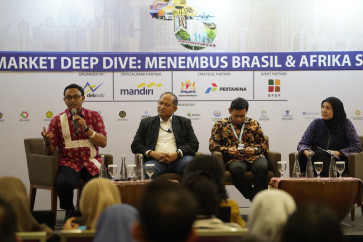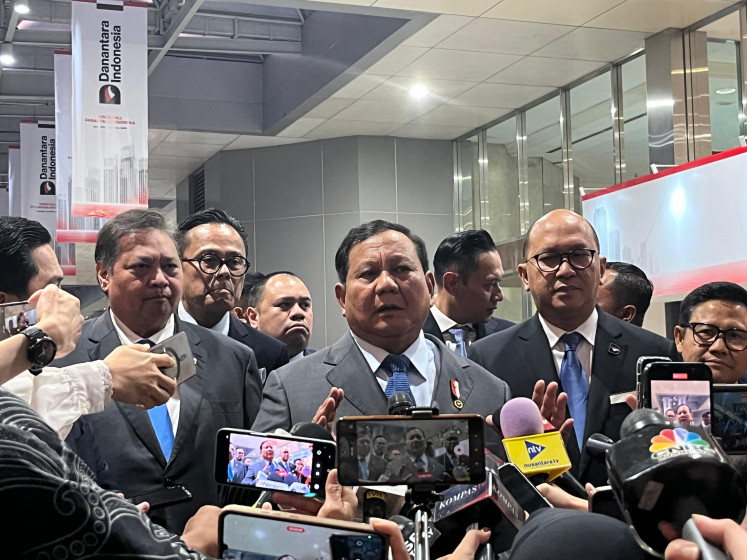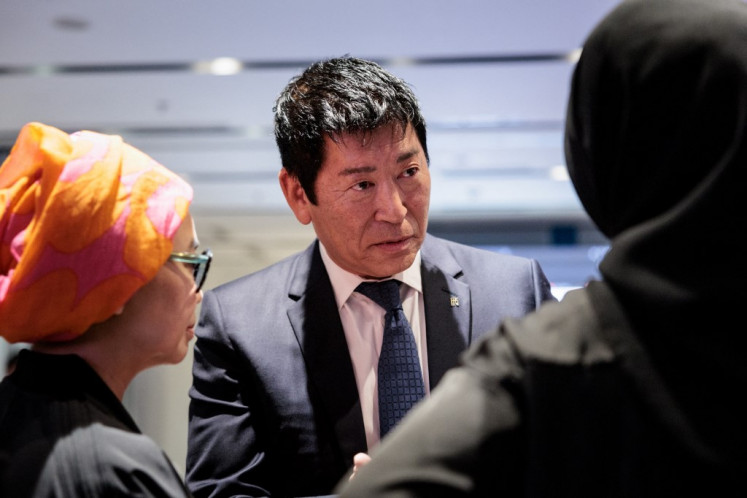Popular Reads
Top Results
Can't find what you're looking for?
View all search resultsPopular Reads
Top Results
Can't find what you're looking for?
View all search resultsASEAN Summit 2016: Time for economic integration
All ASEAN member states agreed to enter the ASEAN Economic Community (AEC) on Dec
Change text size
Gift Premium Articles
to Anyone
A
ll ASEAN member states agreed to enter the ASEAN Economic Community (AEC) on Dec. 31, 2015, but still we as citizens have not felt its effects. This is somewhat contradictory to the vision of the ASEAN Community itself, a people-centered organization. To give some insights, ASEAN needs to learn from the economic integration developments in the EU.
This article tries to propose some suggestions regarding the development of the AEC to be more people-oriented, and not just about political discussions among the elites.
There are three main suggestions in this contribution, these are: asserting the rule of law in the dispute-settlement mechanism regarding trade disputes, increasing the contribution of national legislatures in the integration process, and arranging some attempts regarding social cohesion among ASEAN people.
First, leaders in ASEAN should consider amending the provisions regarding dispute settlement in trade matters in the ASEAN Charter.
Within the AEC, in the blueprint of which the ASEAN Single Market and Production Base is one of the main policies, there will be plenty of cross-border trade transactions among stakeholders. It is unavoidable that there will be many potential disputes regarding economic transactions.
Looking to the ASEAN Charter, the given dispute-settlement mechanism seems to be insufficient to facilitate this condition.
According to Article 24 (3) of the ASEAN Charter, all disputes concerning economic agreement in ASEAN should be settled in accordance with the ASEAN Protocol on Enhanced Dispute Settlement Mechanism (EDSM).
Then, according to Article 26 of the ASEAN Charter, if the dispute cannot be resolved, it shall be referred to the ASEAN Summit for its final decision.
Based on these provisions, the approach of this dispute settlement is political rather than legal since the ASEAN Summit consists of leaders of ASEAN member states and the decision-making process in this forum is by consensus.
Indeed, resolving disputes through a political approach causes many drawbacks for the AEC.
It provides no legal certainty to private stakeholders, such as investors. Therefore, ASEAN leaders should realize that the recent mechanism in the ASEAN Charter lacks legal certainty and conflicts with one of the principles of ASEAN: adherence to the rule of law.
Hence, it is important to amend the dispute-settlement mechanism in the ASEAN Charter to a new mechanism that gives legal certainty, impartiality and ensures it is binding on all disputing parties.
The EU has a clear legal mechanism regarding dispute settlement in economic matters.
In addition to the Court of Justice of the EU, the EU legal system acknowledges national courts to have a role in solving disputes regarding cross-border matters within the EU member states.
Within this framework, the EU gives legal certainty to all stakeholders regarding dispute settlement in economic matters.
Secondly, ASEAN leaders should realize the importance of national legislatures’ involvement in AEC.
Learning from the recent conditions in the EU, there has been a variety of sentiments with regard to the EU since the Brexit issue.
Regardless of the pros and cons of the Brexit issue, this situation has arisen because of the lack of involvement from national-level politicians of the EU member states in the decision-making process in the EU.
It cannot be denied, even though the EU is well known as a supranational organization, that the influence of member states is still the “center of gravity” of the EU.
Back to ASEAN, the recent conditions of ASEAN’s economic integration are simply the issues of the elites and a selection of intellectuals who have concerns about them.
Many people do not realize what ASEAN is, what kind of creature ASEAN is. What does it mean to be part of the AEC? Even many national-level lawmakers are not aware of the AEC.
To avoid symptoms of disunity in ASEAN integration in the future, ASEAN should open its decision-making process, in some extent, to be more relevant to the national legislatures.
I believe the involvement of national legislatures in the decision-making process of ASEAN would avoid resistance to economic integration in ASEAN from politicians at the national level, just like what is happening in the EU nowadays.
Third, ASEAN leaders should start to prepare their people for the presence of “foreigners” from neighboring ASEAN countries. In other words, the citizens of ASEAN should start to be more socially integrated with citizens of other ASEAN countries.
Learning from the EU, it has no common European identity that provides EU citizens with a sense of unity.
Thailand has done something insightful in this regard. The Thai government obliges pupils in primary and secondary school to learn to say “hello” in the 10 different languages of the ASEAN member states.
This can be seen as a good initiative by the Thai government to prepare its people to meet with their neighbors from other ASEAN member states.
Therefore, local people will not see “foreigners” from ASEAN member states as a threat to them.
All in all, it seems that ASEAN leaders nowadays still treat ASEAN as a tool for preserving security and peace in the region.
In this era of globalization, regional organizations can also be used as a tool to achieve wealth for its member states.
_______________________________
The writer, who graduated from Leiden Law School, Master of European Law Program, is also the chairman of the Indonesian Students Association in the Netherlands (PPI Belanda). The views expressed are his own.










